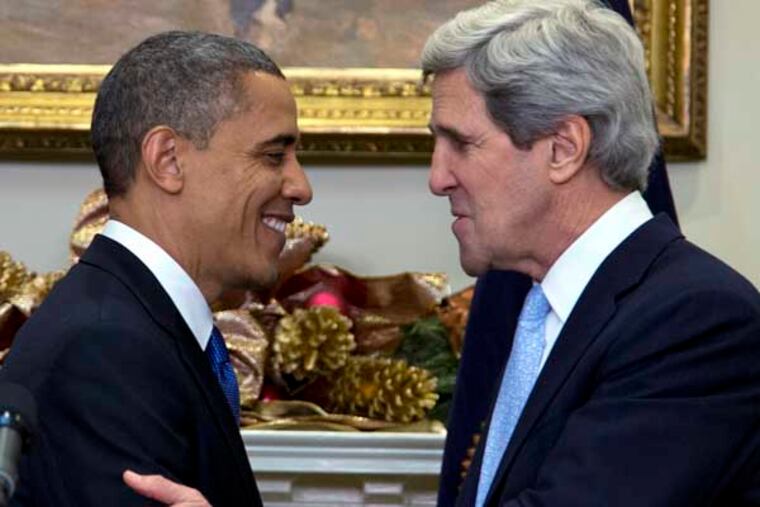Kerry picked to be top diplomat
Obama announced his choice to replace Clinton, citing the senator's "extraordinarily distinguished" career.

WASHINGTON - President Obama on Friday nominated Sen. John Kerry for secretary of state in his second term, calling the Vietnam veteran and onetime presidential contender the "perfect choice to guide American diplomacy."
Kerry's nomination was all but assured after U.N. Ambassador Susan Rice, once considered a shoo-in to succeed Hillary Rodham Clinton, withdrew her name from consideration amid intense Republican opposition that would have ensured an ugly Senate confirmation process.
Kerry, a Massachusetts Democrat known for his gravitas and statesmanship, isn't likely to face such opposition, and Obama told him Friday that he was "confident the Senate will confirm you quickly."
Kerry's bigger challenge would come after confirmation, as Clinton's replacement will inherit a department that's just been slammed by an independent panel on the deadly Sept. 11 attacks on U.S. posts in Libya.
He would be in charge of fixing the serious, systemic leadership problems the investigating panel found at State, while also finding ways to boost the morale of a diplomatic corps that is still reeling from the killing of a popular ambassador and the fallout from the report's harsh criticisms.
And then there's the Syrian civil war, North Korean posturing, Iranian nuclear ambitions, North African political transitions, and strained relations with Russia, to name but a few of the urgent foreign policy issues he will confront.
Kerry also would have to manage the effort to negotiate a political settlement to the war in Afghanistan, a conflict in which he has invested considerable personal attention.
Obama, speaking at the White House, said Kerry's military background, family ties to the Foreign Service, "extraordinarily distinguished" Senate career, and chairmanship of the Senate Foreign Relations Committee make him the ideal pick to serve as America's top diplomat.
"John's played a central role in every major foreign policy debate for nearly 30 years," Obama said. "As we turn the page on a decade of war, he understands that we've got to harness all elements of American power and ensure that they're working together - diplomatic and development, economic and political, military and intelligence, as well as the power of our values which inspire so many people around the world."
Obama was expected to have unveiled his full national security team Friday, but the administration has run into snags with former Sen. Chuck Hagel (R., Neb.), a leading contender for defense secretary who is facing growing opposition related to his statements on Israel and gays. On Friday, Hagel issued an apology for remarks he made in 1998 about a gay ambassadorial nominee, saying they "do not reflect my views or the totality of my public record."
Analysts say that by announcing Kerry's nomination separately, Obama sets him apart from candidates who could face a thornier path to Senate confirmation. Kerry, 69, and his wife, Teresa Heinz, 74, stood next to Obama as the nomination was announced.
Senate reaction to the Kerry nomination was overwhelmingly positive, hardly a surprise for a colleague who has been serving since 1985. Traditionally, the Senate confirms presidential appointees with strong bipartisan votes.
They often won't say how they are voting to confirm before hearings, but Friday, they came awfully close.
"We have known John Kerry for many years. We have confidence in John Kerry's ability to carry out the job," said Sen. John McCain (R., Ariz.).
Other conservatives had similarly warm words.
The hearings are likely to involve the controversy over the U.S. role in protecting Americans at the U.S. Consulate and CIA annex in the Libyan city of Benghazi, where Ambassador J. Christopher Stevens and three other Americans died in Sept. 11 attacks. Republicans continued to raise questions about security Friday, but they did not mention the turmoil when they pivoted and discussed Kerry.